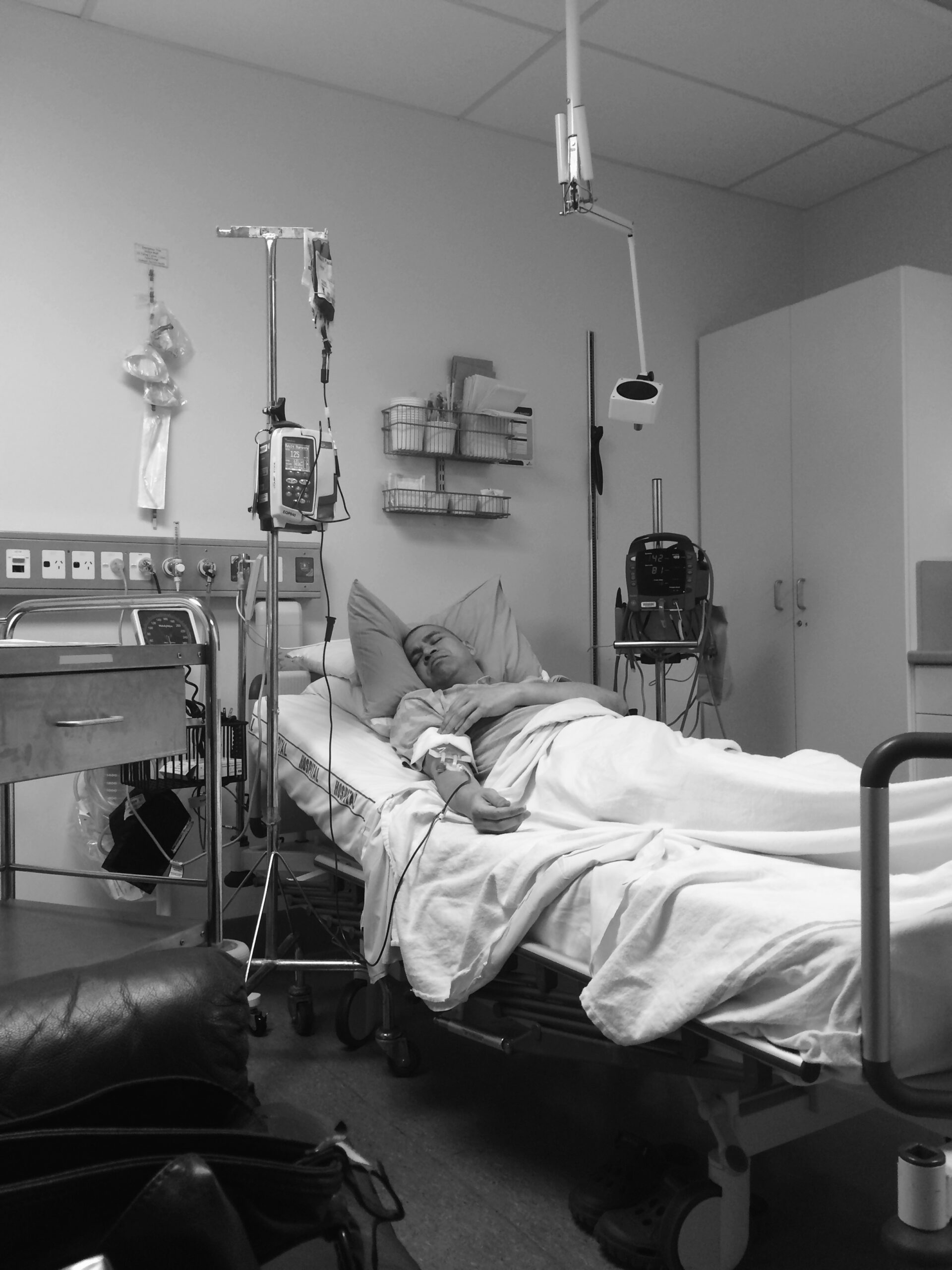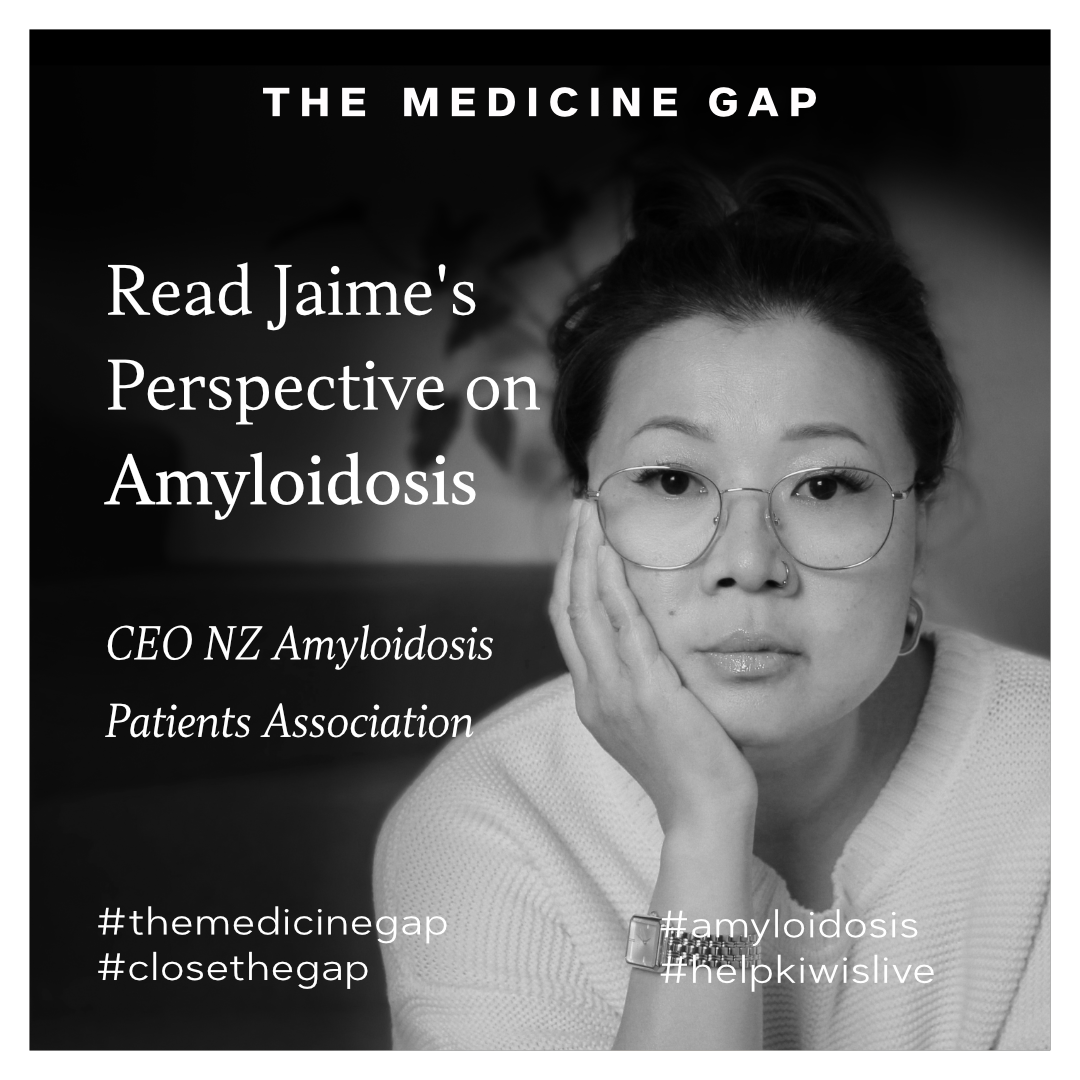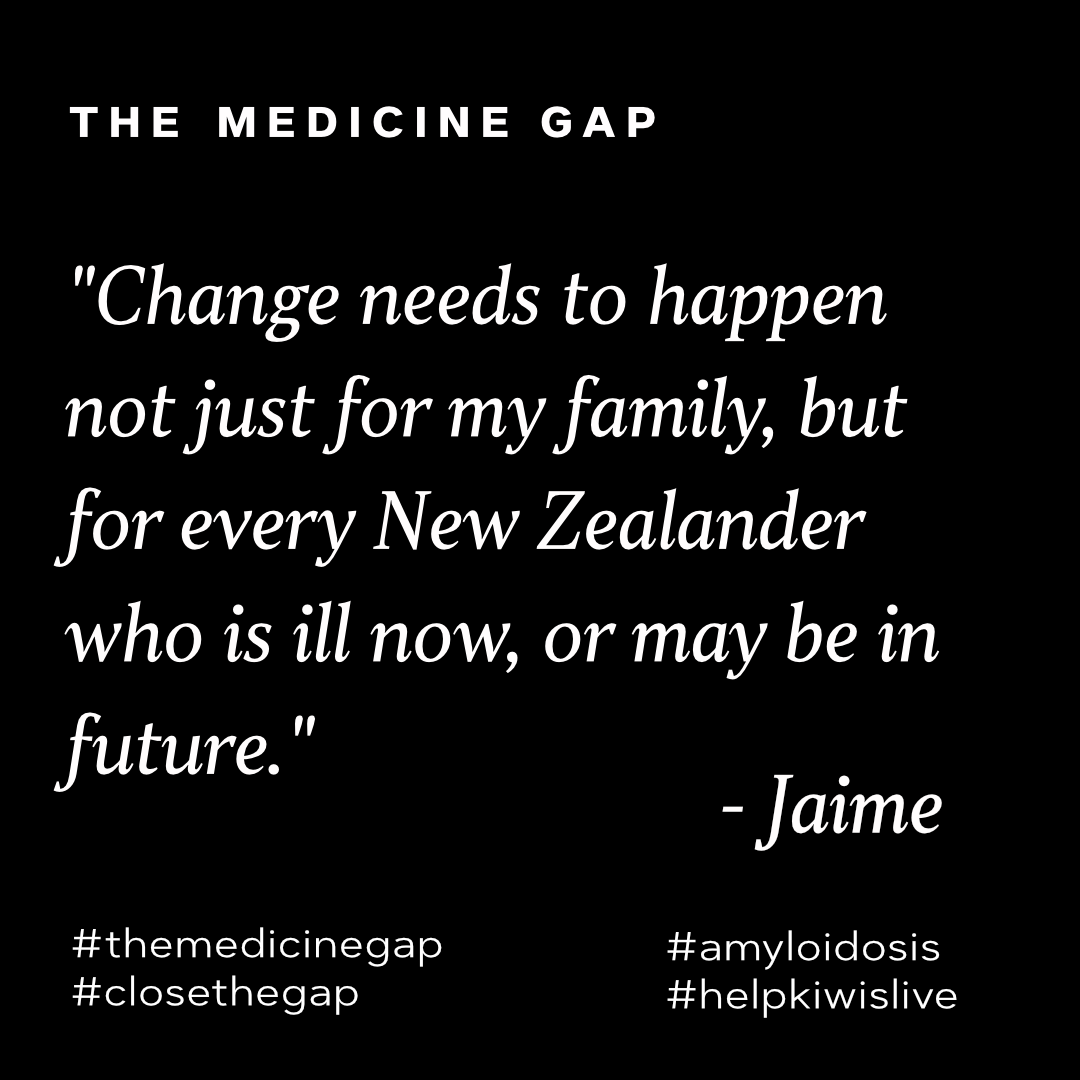Jaime Christmas is the CEO of the NZ Amyloidosis Patients Association

There are many mornings where I wake up, turn around to look at my husband and wonder if New Zealand is the right country for us to live in.
After all, our four children are all grown up and doing well for themselves. It’s not like we have to live here.
And then I try to disquiet the tempest that brews in me, that seems to never go away because it is fuelled by my husband’s suffering. The nights are worst. He takes sleeping pills to put his body into a slumber, but the burning pain in his limbs never subsides, and his mind is functioning constantly in a state of alert.

Aubrey has Hereditary TTR Amyloidosis. He was diagnosed in 2013, and the progression of this disease has heavily impacted our family life. It is too difficult to encapsulate what we have all gone through. I can describe the physical impact of this disease, but it is impossible to detail the mental and emotional toll it has taken on us all.
On so many occasions, we have been jolted from sleep by a bowel issue or accident. The two of us now sleep lightly. I always have an ear out for Aubrey’s sleep apnoea machine. It is the rhythmic sound I need to reassure myself that he is still alive and breathing.

The majority of people reading this, sadly, perhaps think we should move to a country like Australia. After all, what does it matter if there are two fewer people living in New Zealand, particularly if one person is unwell and needs support from the taxpayer?
The irony is that I don’t disagree with this logic, but I am adamant that not everything needs to be looked at through the lens of taxpayer dollars. Yes, we pay a lot of tax in New Zealand. Yes, medicines are expensive. But if we continue to use this as an excuse to base our decisions, New Zealand will become a society that feeds off self-importance and prejudice. The value we place on the human soul will diminish to the point where the sanctity of life becomes distorted, and there will be no difference between living and dying.
Moving to Australia would, I know, provide a more promising outcome for Aubrey, but we are both fully committed citizens of New Zealand. And I have a deep desire to leave a positive legacy for the country I call home.
At the end of 2019, Aubrey and I sat together in a clinic and were told there was nothing else that could be done for him. The clinician said we should enjoy our remaining months together and be thankful that at least Aubrey received a liver transplant in 2016 which gave him some extension of life.

As a wife, how do you walk out of a situation like that without falling apart? I look back and I don’t know how I managed to keep it all in. I became the last line of Aubrey’s defence, reassuring him that everything would work out fine, and that we would find the solution together.
It could be my upbringing or maybe it’s my background in psychology, but I refused to believe it was the end of the road. The epiphany that followed that bleak prognosis still sits with me now; no-one should have the right to tell you when your time is up or dictate a day that you should give up on living.
The New Zealand Amyloidosis Patients Association (NZAPA) was formed at the start of 2020. If I am honest, this charity was formed purely for selfish reasons. I want to save my family.
The charity helped me engage with pharmaceutical companies who had developed modern medicines to treat this horrible, hereditary disease.
I am the caregiver for my husband, but I am also the mother to our four children. If this disease awakens in any of them, I want to know we can access the medicines immediately.
I am not willing to stand by and watch history repeat itself in my children, or for their future partners to endure what I have.
However, this is important for other families too. The more I bury into what’s involved in running a patient’s association, the more I learn that history is already repeating itself in other New Zealand families with the same genetic disease. The more I learn, the more I feel this inner pressure to also fight for the rights of the others who have been diagnosed with amyloidosis.
I look back as I write this and wonder if this was the purpose for me in life all along. That no matter how heartbreaking it has been for me to go through, perhaps I was made for such a time as this. Since our inception, we have accomplished much as an association and now supports well over 50 New Zealanders. Sadly, that number is steadily growing.

For years, countless families have suffered the consequence of this diabolical condition, and many have died not knowing what they were suffering from. When I drive past a cemetery, I can’t help but wonder if there are people whose lives could have been saved or extended if just one person had stood up to help them.
Rare disease in New Zealand is a taboo topic to many, not least to people in a position of influence. It’s estimated that 300,000 New Zealanders live with a rare condition, but they are often disregarded or sidestepped. If you are ill, weak or have a terminal diagnosis, can you truly have a voice?
I am not here to cast judgment on anyone, nor am I pointing the finger at any one person. It’s important that I am tactful and diplomatic on behalf of a patient’s association, but if I were to put my caregiving and mothering hat on, I am angry.
New Zealand, at times, can be a nation of bystanders. If it doesn’t affect us personally, we don’t speak out.
Yes, we’ll give money to Givealittle or GoFundMe pages and help people to get the drugs that they need. But should we, as New Zealanders, allow this deplorable situation of self-funding for modern medicines to continue?
Is this the reality and truth for New Zealand?
When I compare this country’s medicine access to the rest of the world, I am overcome with apprehension and concern. It comes down to funding and for some years now, we’ve been falling further and further behind.
Innovative medical science has created so many new opportunities for the biopharmaceutical industry.
More than 770 medicines for rare illnesses have been approved by America’s Food and Drug Administration (FDA), with another 560 medicines in the pipeline.
The Pfizer-BioNTech COVID-19 vaccine was made using mRNA technology developed to treat and potentially cure diseases like TTR Amyloidosis. This highlights why there is a great need for our Ministry of Health to get future-ready, to be more forward-thinking, to plan, to find solutions, to drive improved health outcomes and to be more strategic in the way it approaches our procurement of modern medicines – and not just for the masses, but for every single, unique New Zealander.

So, as much as I wake up wanting to jump ship and move to Australia, I have too much at stake in New Zealand. Change needs to happen not just for my family, but for every New Zealander who is ill now, or may be in future.
To this day, when I sing our national anthem, I still tear up. I hold onto the pledge that it is through the bonds of love that we meet.
Please hear our voices, I entreat. Men of every creed and race, we gather here before all, and hand in hand we will fight against dissension, envy, hate, and corruption.
If we all come together, if we stand up, if we find our voice, we can make our country good and great. That’s what we are asked to do. To defend New Zealand and all those who live here.
Show your support.
Share Jaime and Aubrey‘s story.
New Zealand needs access now to modern medicines to treat Amyloidosis.




Other Voices
Let’s close the Gap
Get Involved1.
REFORM
PHARMAC
Achieve a measurable, political commitment to reform Pharmac and create a fit-for-purpose drug-buying agency that supports and enables greatly improved access to modern medicines – and ensure a direct line of political accountability.
2.
OVERHAUL THE FUNDING
METHODOLOGY
Introduce a globally accepted modern, cost-benefit analysis for medicines and medical devices which looks at the ‘value’ of a medicine, and considers the financial, economic, and social impact of untreated disease on our society.
3.
COMMIT TO AN OUTCOMES-BASED MEDICAL STRATEGY
Develop a Medicines Strategy to guide the decision-making process, create measurable targets to reduce Pharmac’s waiting list, and detail how the agency will respond to rapid developments in modern medicine to improve health outcomes for New Zealanders.